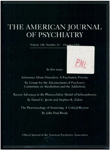Pathophysiology of HPA axis abnormalities in patients with major depression: an update
Abstract
Four hypotheses have been proposed to explain why nonsuppression on the dexamethasone suppression test occurs in patients with major depression. These include 1) increased metabolism of dexamethasone, 2) decreased sensitivity of pituitary glucocorticoid receptors to dexamethasone, 3) hyperresponsivity of the adrenal gland to ACTH stimulation, and 4) increased central drive of the pituitary from hypothalamic/limbic structures that overrides the action of the dexamethasone. A critical review of the literature suggests that the last hypothesis is most closely supported by the data. Despite this conclusion, factors other than depression may be involved in hypothalamic-pituitary-adrenal axis dysfunction.
Access content
To read the fulltext, please use one of the options below to sign in or purchase access.- Personal login
- Institutional Login
- Sign in via OpenAthens
- Register for access
-
Please login/register if you wish to pair your device and check access availability.
Not a subscriber?
PsychiatryOnline subscription options offer access to the DSM-5 library, books, journals, CME, and patient resources. This all-in-one virtual library provides psychiatrists and mental health professionals with key resources for diagnosis, treatment, research, and professional development.
Need more help? PsychiatryOnline Customer Service may be reached by emailing [email protected] or by calling 800-368-5777 (in the U.S.) or 703-907-7322 (outside the U.S.).



